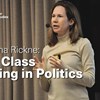coworkers
Professor Thomas Lindh has passed away
Today we mourn the passing of Thomas Lindh, a respected researcher, an appreciated colleague and a dear friend. Professor Thomas Lindh has been a coworker at the Institute for Futures Studies for many
NEW SEMINAR: Social Networks, Employee Selection and Labor Market Outcomes: Toward an Empirical Analysis
Oskar Nordström Skans och Lena Hensvik, Institutet för arbetsmarknads- och utbildningspolitisk utvärdering The Montgomery (1991) model of employee referrals suggests that it is optimal for firms to sel
"Unique values among workers in tech"
In a new study of political values among workers in the American tech industry researchers found a ”unique” dominance of left-liberal values and anti-establishement thinking. We asked Niels Selling, p
The scope and limits of implicit bias training: An experimental study with Swedish social workers
Social Science Information Abstract Implicit bias reduction has become an increasingly popular feature of so-called ‘diversity training’ in both public and private organizations. It remains popular, des
Research seminar with Oskar Nordström Skans: The Heterogeneous Earnings Impact of Job Loss Across Workers, Establishments, and Markets
Venue: Institutet för framtidsstudier, Holländargatan 13, 4th floor, Stockholm, and online Research seminar with Oskar Nordström Skans, Professor of Economics, Uppsala University. REGISTERAbstractUsing g
Does Immigration Hurt Low Income Workers? Immigration and Real Wage Income below the 50th Percentile, Sweden 1993-2003
Working Paper 2010 no.6 This paper addresses potential effects of immigration on wage income of predominantly low income Swedish born workers, for which the estimates show mainly a positive relationshi
Research seminar with Johanna Rickne: The Class Ceiling in Politics
Venue: Institutet för framtidsstudier, Holländargatan 13, 4th floor, Stockholm, or online.Research seminar with Johanna Rickne, professor of Economics at SOFI, Stockholm University.Register hereAbstracPrior studies have documented that working-class individuals rarely become parliamentarians. We know less about when in the career pipeline to parliament workers disappear, and why. We study these questions using detailed data on the universe of Swedish politicians’ careers over a 50-year period. We find roughly equal-sized declines in the proportion of workers on various rungs of the political career ladder ranging from local to national office. We reject the potential explanations that workers lack political ambition, public service motivation, honesty, or voter support. And while workers’ average high school grades and cognitive test scores are lower, this cannot explain their large promotion disadvantage, a situation that we label a class ceiling. Organizational ties to blue-collar unions help workers advance, but only to lower-level positions in left-leaning parties. We conclude that efforts to improve workers’ numerical representation should apply throughout the career ladder and focus on intra-party processes.

Johanna Rickne: The Class Ceiling in Politics
Research seminar with Johanna Rickne, professor of Economics at SOFI, Stockholm University Abstract: Prior studies have documented that working-class individuals rarely become parliamentarians. We kno
Basic Income in the Capitalist Economy: The Mirage of ‘Exit’ From Employment
Basic Income Studies, 11 (1), 61–74. https://doi.org/10.1515/bis-2016-0013 Abstract A widespread argument in the basic income debate is that the unconditional entitlement to a secure income floor improve

Chiara Cordelli: The Wrong of Capitalism Beyond Domination
Political philosophy is witnessing a revival of critiques of capitalism. Against those who argue that capitalism is unjust because of (i) its distributive outcomes, (ii) the oppression of workers at t








